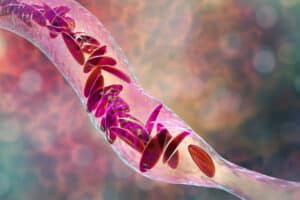 Researchers have recently found that severe anemia is common in patients with chronic kidney disease (CKD). In a study carried on a number of patients with non-dialysis-dependent chronic kidney disease, it was discovered that almost a quarter of them had severe anemia. This was according to a presentation shown at the American Society of Nephrology’s Kidney Week 2019 meeting.
Researchers have recently found that severe anemia is common in patients with chronic kidney disease (CKD). In a study carried on a number of patients with non-dialysis-dependent chronic kidney disease, it was discovered that almost a quarter of them had severe anemia. This was according to a presentation shown at the American Society of Nephrology’s Kidney Week 2019 meeting.
The Link Between CDK and Severe Anemia
According to the study, of 22,720 patients with CKD between stages 3a and 5, about 23% (5283 patients) suffered from severe anemia. This meant that their hemoglobin level was below 10 g/dL, requiring treatment to improve their condition. The incident rate was reported as about 9 out of 100 people for developing anemia over a 5-year period.
Another study that used 2007–2010 data from the National Health and Nutrition Examination Survey (NHANES) also points to a link between CKD and severe anemia. These studies, however, defined severe anemia as a hemoglobin level of 13 g/dL or less in men and 12 g/dL or less for women.
According to doctors involved in these studies, the primary reason for the disparity in the results of these two findings is that the former study focused on period prevalence (hemoglobin level of less than 10 g/dL during a 6 month timeframe) whereas the NHANES used point prevalence (hemoglobin level reaching 10 g/dL at any given point in time). In both cases, however, a link between CKD and severe anemia was identified.
What is Anemia?
Anemia is a condition where the body lacks enough healthy red blood cells to carry an adequate amount of oxygen to your body’s tissues. Anemia can lead to your body feeling weak and tired. Severe anemia could result in irregular heartbeats, constant headaches, chest pain, and pale or yellowish skin. The condition worsens as it develops and may require medical intervention.
How Does CDK Cause Anemia?
When the kidneys are damaged, they produce less of a hormone known as erythropoietin. This is needed to make red blood cells. If the kidneys are damaged, this results in fewer cells being made, leading to anemia. Since they are a vital function in carrying hemoglobin (and by extension, oxygen) around the body, it can cause symptoms like dizziness and shortness of breath when you have CKD.
Anemia is usually diagnosed via a blood test, so if you’re unsure if you have anemia or not, it’s worth contacting your physician for more information. Your blood count (haemoglobin; Hb), iron, vitamin B12, and folate levels will be measured to confirm the type and severity of anemia.
Treating Anemia
Mild anemia typically doesn’t need specialized treatment, especially if you aren’t showing any symptoms. However, severe anemia may require supplements and injections of ESA or a replacement for the erythropoietin hormone. In earlier stages of CKD, this may be given in tablet form. However, advanced kidney disease will likely need iron infusions given into a vein instead.
This may require regular blood pressure monitoring, but ESA injections can be done at home with the help of a nurse, family member or even yourself.

